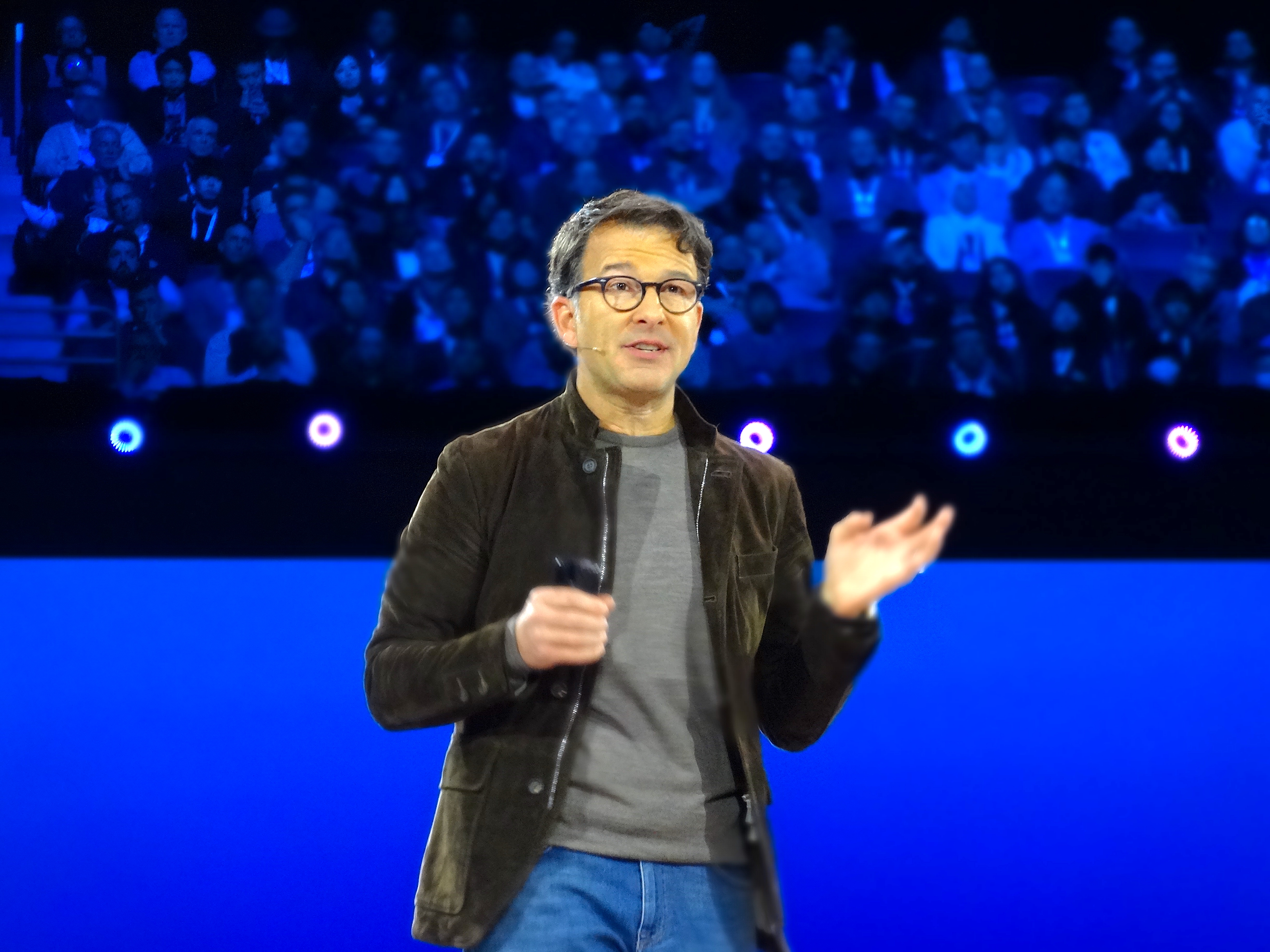Those were sighs of relief you heard from investors after Nvidia reported better-than-expected earnings, putting off for awhile longer worries about an AI bubble.
But they quickly turned into sighs of resignation. Nvidia’s stock ended up declining 3% on Thursday as enthusiasm for richly valued tech stocks wore thin, even for the wealthiest of them all.
Nonetheless, Nvidia is getting spendy with all its gains, investing $10 billion in Anthropic — twice as much as Microsoft’s concurrent investment — helping fund xAI’s Saudi AI data center project, contributing GPUs and money to Brookfield’s $100 billion infrastructure program, and helping bankroll AI music startup Suno. There’s more, I just can’t remember them all.
Meanwhile, despite bubble fears, venture and institutional investors can’t seem to get enough of AI model companies (and the data centers to run them), even if retail investors are worried. If you’re named Jeff Bezos, maybe that’s not surprising, especially if he’s really going to be back in the saddle as a co-CEO at Project Prometheus. But there’s also multimodal model developer Luma AI, which raised $900 million in funding, Japan’s Sakana AI, which raised $135 million, and Physical Intelligence, another Bezos-backed startup that raised $600 million to develop robot-focused models.
At Microsoft’s Ignite conference in San Francisco this week, Judson Althoff (pictured), newly appointed CEO of its Commercial business, made the case that it can provide the central place for enterprises to access, create and bring in all the AI agents they need, with their own data, even if it’s being stored elsewhere. It wasn’t especially exciting, but Microsoft made a credible case to enterprises, which don’t always want “exciting” technology. Check out our complete coverage below, along with a few things I learned at the event.
Palo Alto Networks continues to expand its horizons, buying cloud-native observability firm Chronosphere for $3.35 billion. TheCUBE Research’s Bob Laliberte and Paul Nashawaty explained that it signals a new melding of observability and cybersecurity.
Big Tech is set to keep getting bigger, as Meta escaped having to sell off Instagram and WhatsApp in what is widely seen as a general hall pass for the tech giants — though honestly, with TikTok still ascendant, it’s hard to argue there isn’t credible competition in social media. In addition, Trump may sign an executive order to quash individual state AI laws that big AI companies don’t like. All that CEO toadying paid off, I guess. For now.
Next week comes a cluster of earnings from major computer and compute infrastructure companies: Dell, HP, NetApp and Nutanix.
Here’s all the enterprise and emerging tech news, views and analysis this week from News and beyond:
AI and data: Microsoft’s agent superstore
Analysis and food for thought
Wall Street blows past bubble worries to supercharge AI spending frenzy (per the Wall Street Journal)
But even Sundar Pichai appears worried: Google boss says trillion-dollar AI investment boom has ‘elements of irrationality’
As are investors: AI bubble fears hit stocks again And even Nvidia’s boffo quarter didn’t quite quell them.
Data center capacity becomes the new battleground for AI growth: theCUBE’s analysis from SC25
How generative AI is reshaping venture capital TL;DR: Don’t be the Mama Bear of VC firms, says Tom Davenport
Don’t ignore the security risks of agentic AI
The latest in a series of AI case studies from Paul Gillin: From credit ratings to AI in the cloud: Experian’s quiet reinvention
Erstwhile Meta AI chief Yann LeCun says world models are the next step beyond large language models: He’s been right about AI for 40 years. Now he thinks everyone is wrong (from the Wall Street Journal)
Money matters
Nvidia, Microsoft to invest up to $15B in Anthropic as part of new cloud partnership
Report: Startup co-led by Jeff Bezos raises $6.2B to develop ‘AI for the physical economy’
Databricks in talks to raise capital at valuation above $130B (per The Information) As good a sign as any that IPOs still aren’t back in a big way, since this would be the biggest in years.
Nvidia ups spending on AI data centers with xAI Saudi project and Brookfield’s $100B infrastructure plan
Multimodal AI developer Luma AI raises $900M in funding
Jeff Bezos-backed Physical Intelligence raises $600M to improve its AI robot brains
Cloudflare acquires AI deployment startup Replicate
Genspark raises $275M in funding for its AI productivity suite
Nvidia backs $250M funding round for AI music startup Suno
Sakana AI lands $135M on $2.635B valuation to accelerate frontier research and applied AI in Japan
Profluent Bio raises $106M from Jeff Bezos and others to accelerate protein design with AI
Intuit partners with OpenAI in $100M deal to integrate its finance applications with ChatGPT
Workday to acquire Pipedream to extend AI agent integrations across enterprise apps
AI agent identity startup Keycard acquires Runebook to empower MCP connectivity
Numeric lands $51 million to expand its AI accounting platform
Archetype raises $35M to automate sensor data analysis with AI
Modern Life raises $20M to bring AI-powered efficiency to life insurance advisers
Coverbase raises $16.5M to expand its AI procurement and risk platform
AlphaXiv raises $7M in funding to become the GitHub of AI research
Agentic AI startup Kaaj secures $3.8M to expand credit intelligence platform
Orion raises $3.5M to bring predictive AI to physical risk and supply-chain visibility
New models and services
Google’s Gemini 3 AI model makes its long-awaited debut, crushing rivals on top benchmarks Just a year or so ago, everyone seemed to think Google trailed hopelessly in AI, but I never thought it was really that far behind. Investors agree: Google parent Alphabet’s stock rose 6% Wednesday. Now Warren Buffett has noticed that it has all the pieces in place. And even OpenAI CEO Sam Altman is looking over his shoulder at Google. (Not that it’s perfect, as AI researcher Andrej Karpathy found out.)
And that wasn’t all this week: Google launches Nano Banana Pro image generation model with reasoning features
Ai2 releases Olmo 3 open models, rivaling Meta, DeepSeek and others on performance and efficiency
Google DeepMind and Google Research debut WeatherNext 2, its most advanced and efficient forecasting model
Meta’s new image segmentation models can identify objects and people and reconstruct them in 3D
AWS launches Kiro Code into general availability with team features and CLI support
AWS develops AI agents to speed up AWS ProServe consulting projects
Salesforce launches deep observability tools for agentic AI
Writer upgrades agentic AI capabilities with new AI agent for enterprise work
AlertD launches with agentic AI to eliminate DevOps toil and dashboard fatigue
Cloudian launches HyperScale AI Data Platform to unlock enterprise knowledge with Nvidia AI
Kyndryl announces Agentic AI Digital Trust to support governance of AI agents at scale
Coverage from Microsoft Ignite: All about AI agents
A few random thoughts from wandering around Ignite and talking with executives:
* The marquee announcement among the 70 (!) products, if you can pick one, was Agent 365, which it positioned as the control plane for both Microsoft and outside agents, including governance and security that today are still an obstacle for enterprises — even the “frontier” enterprises, as it likes to call those leading the way. The company argues, reasonably, that enterprises will find it easier to do all this inside the infrastructure they’re already using, such as Azure and Windows.
* Nowhere is the notion that it helps to have a unified platform for agents more apparent than in the reality that data is what drives the usefulness of agents. One key message from chief information officers, Yitzhak Kesselman, corporate VP of messaging and real-time analytics, told me, is: “I don’t want to be the chief integration officer.” That’s why Microsoft is pitching Fabric IQ as an intelligence platform that brings in data in real time from wherever it’s residing in an enterprise. “There is no AI without real-time intelligence,” he said. “Fabric IQ enables agents to be much more precise.”
* Agents will fundamentally change software and how people use technology, said Jason Graefe, corporate VP for the Azure Partner Catalyst Team. “There’ll be a consolidation of interfaces,” he told me in an interview. “You have something that understands you, rather than you having to understand them.”
* And it’s managing those agents largely as if they’re people, assigning them tasks that presumably people did before, with similar access policies and the like – perhaps a useful metaphor, but I would argue an imperfect one. This is still software, after all, even if with generative AI, it’s now more probabilistic than deterministic, as Amanda Silver, head of product for apps and agents in Microsoft’s CoreAI group put it to me – a fancy way of saying it’s rather less predictable and thus require perhaps more human oversight for now.
* For all the talk about agents, enterprises are still moving carefully, and widespread adoption is further away than either providers such as Microsoft or enterprises using them will readily admit. It’s significant that throughout the keynote, Microsoft felt compelled to use an imaginary firm to show how all this stuff works.
* On the question of whether Microsoft as well as Google, Amazon, OpenAI and other might be overbuilding, with Nvidia chips whose value may depreciate fast, Microsoft general manager for Azure and infrastructure Alistair Speirs said one hedge they have is that chips used for training models later can power inference, the running of the models in response to queries. “That leads us to avoid overbuilding for a particular generation,” he said.
* Microsoft executives in the keynote, led for the first time by Judson Althoff, overall managed to make their case, but the keynote didn’t seem to generate all that much enthusiasm among the 20,000 attendees – applause was fitful. Some analysts privately were more pointed. “Too many products, not enough passion,” said one. Sure, we missed Microsoft CEO Satya Nadella, but I’ll give Althoff some time to get his keynote footing – that’s a tough job.
And our complete coverage of the news at Ignite:
The big picture from theCUBE Research: Microsoft Ignite 2025 wrap-up: From copilots to agents, Microsoft races to the frontier firm
Microsoft introduces Agent 365 control center and a pack of new AI agents for enterprise users
Microsoft rolls out major updates for building and managing enterprise AI agents
Microsoft’s Azure Copilot to support agentic cloud operations at scale with new AI agents
Microsoft Power Platform get new agentic and governance capabilities
Copilot Mode makes Edge for Business into an enterprise-ready agentic browser
Microsoft updates database portfolio and adds open-source offerings
Microsoft accelerates automation in Windows with MCP and agent connectors
Microsoft leans hard on autonomous security for AI agents
Vast Data partners with Microsoft to power the next wave of agentic AI And the lowdown from Vast co-founder Jeff Denworth on theCUBE: Vast Data deepens Azure collaboration as enterprises race to modernize for agentic AI
Policy
Report: Trump could sign executive order to preempt state AI laws
EU to revise GDPR, AI Act as part of regulatory simplification push
There’s even more AI and big data news on News
Around the enterprise: Nvidia almost saves the day
Money matters
What AI bubble? Nvidia crushes expectations again, as revenue jumps 62%
AI cloud operator Lambda raises $1.5B+ to build data centers
Adobe to acquire Semrush in $1.9B deal to boost generative engine optimization capabilities
US backs $1B loan to restart Three Mile Island nuclear plant
GlobalFoundries acquires Advanced Micro Foundry to expand AI infrastructure portfolio
Financial technology startup Ramp closes $300M investment at $32B valuation
Celero Communications raises $140M to scale coherent DSP technology for AI infrastructure
Elastic beats earnings expectations but its stock crumbles in late trading on mounting losses
SoftBank’s $6.5B deal for chipmaker Ampere wins FTC nod
Java cloud platform firm Azul announces majority strategic investment from Thoma Bravo
Hammerhead AI raises $10M to tackle the AI energy crisis in data centers
Taho takes aim at Kubernetes with its high-performance compute framework for AI workloads
Policy
Judge rules WhatsApp and Instagram acquisitions aren’t monopolization
Disruptions
Cloudflare outage briefly takes ChatGPT, Claude and other services offline The cause: a bug, not an attack
New products and services
Legal startup tackles the hidden risk of shifting contract terms
We have lots more news on cloud, infrastructure and apps
Cyber beat: Palo Alto Networks beefs up
Money matters
Palo Alto Networks announces $3.35B Chronosphere acquisition after beating earnings forecast TheCUBE Research’s Bob Laliberte and Paul Nashawaty explained what’s up: Palo Alto Networks’ $3.35B Chronosphere bet signals the next era of AI observability
Guardio lands $80M to expand AI-driven protection for everyday internet users
Social engineering defense platform Doppel raises $70M in Series C funding
Apono raises $34M to tackle cloud privilege sprawl with Zero Standing Privilege model
Cyber specialist Method Security raises $26M (per Axios)
MCP AI agent security startup Runlayer launches with $11M from Khosla’s Keith Rabois and Felicis
Secure.com introduces Digital Security Teammates after $4.5M investment
Attack & response
Gainsight breach compromises major tech firms’ Salesforce instances
SquareX warns hidden API in Perplexity’s Comet browser enables full device takeover
New products and services
Cisco expands secure-by-default strategy with new resilient infrastructure initiative
Tanium rolls out agentic AI upgrades, expanded endpoint management and new security tools
Vanta launches Agentic Trust Platform to unify compliance, risk and trust programs
More cybersecurity news here
Elsewhere in tech: Robots on the march
IBM and Cisco want to build a quantum internet by the late 2030s
Sunday wants to put a robot in every home, beginning with the launch of Memo
Crypto exchange Bitrue launches AI-powered trading feature using GPT-5, Gemini and Claude
Alphabet’s Intrinsic and Foxconn plan to accelerate factory automation with smarter robots
Reelables raises $10.4M to innovate supply chains with wireless smart label technology
Parallax Worlds raises $4.9M to help companies virtually stress-test industrial robots
And check out more news on emerging tech, blockchain and crypto and policy
Comings and goings: Bye-bye, Zuck
Meta Chief AI Scientist Yann Lecun exited company to begin working on new AI startup.
And that’s not all: Meta Chief Revenue Officer John Hegeman is leaving to form own startup. Andrew Bocking, vice president of monetization product, who currently reports to Hegeman, will replace him. Clara Shih, who joined Meta last November from Salesforce and reported to Hegeman, is also leaving after the unexpected death of her father (per The Information). Meanwhile, PyTorch creator Soumith Chintala, a top Meta AI researcher, joined Mira Murati’s startup Thinking Machines Lab (per Business Insider)
Google DeepMind hired Aaron Saunders, former chief technology officer of Boston Dynamics as VP of hardware engineering earlier this month (per Wired)
Larry Summers resigned from the OpenAI board after release of emails with Epstein.
Synopsys appointed a new CRO: Mike Ellow, former CEO of Siemens EDA, Siemens Digital Industries Software.
Cyera promoted Steve Rog to CRO.
Yet another new CRO: Former Expel CRO Jennifer Lawrence joined data platform Redpanda.
What’s next
Events
Dec. 1-5: AWS re:Invent, Las Vegas. News and theCUBE will be onsite with news, analysis and interviews.
Earnings: pre-Thanksgiving rush
Monday, Nov. 24: Zoom
Tuesday, Nov. 25: Dell, HP, NetApp, Nutanix, Workday, Zscaler, Autodesk
Photo: Robert Hof/ News
Support our mission to keep content open and free by engaging with theCUBE community. Join theCUBE’s Alumni Trust Network, where technology leaders connect, share intelligence and create opportunities.
- 15M+ viewers of theCUBE videos, powering conversations across AI, cloud, cybersecurity and more
- 11.4k+ theCUBE alumni — Connect with more than 11,400 tech and business leaders shaping the future through a unique trusted-based network.
About News Media
Founded by tech visionaries John Furrier and Dave Vellante, News Media has built a dynamic ecosystem of industry-leading digital media brands that reach 15+ million elite tech professionals. Our new proprietary theCUBE AI Video Cloud is breaking ground in audience interaction, leveraging theCUBEai.com neural network to help technology companies make data-driven decisions and stay at the forefront of industry conversations.









